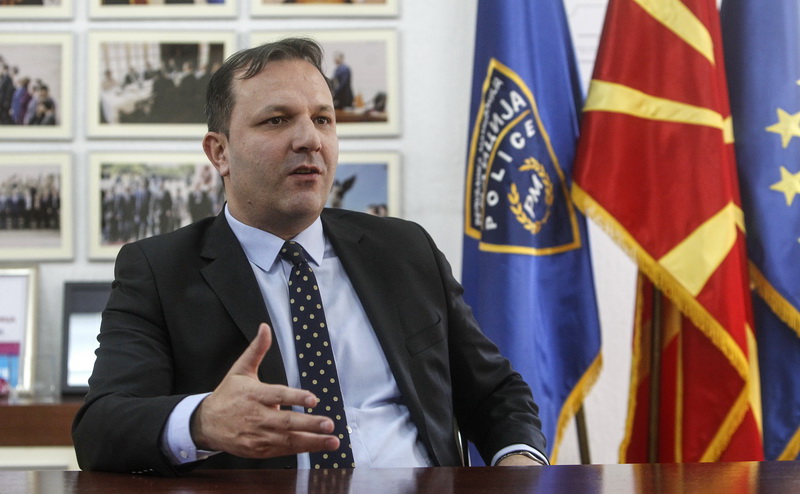Spasovski – designated critic of the court

Neither the Criminal Court nor the Special Public Prosecutor’s Office has reacted to the statement by Interior Minister Oliver Spasovski in which he criticizes the judicial authorities, after the suspected businessman Orce Kamchev was issued a passport in order to participate in meetings of the Board of Directors and education abroad. Minister Spasovski, in his address and later in a statement to the media, without mentioning Kamchev, very directly stated that there cannot be a fight against organized crime while the court keeps releasing transnational criminals.
“There are no financial investigations, there is no fight against organized crime and corruption if those connections of individuals that ruin the reputation of these institutions are getting stronger, and thus prevent direct proceedings and financial investigations. This may be strange, it may be ridiculous, but I say it because many times before there were situations where the MoI would arrest them in the morning, the court would release them in the afternoon, the MOI to arrest for criminal acts, the Prosecution to summon the case on a regular basis. If we all don’t know these things and if we don’t acknowledge them, the country will not progress, and all these efforts will be in vain,” Spasovski said in his address. Then in a statement to the media, he said there were cases where the Ministry of Interior worked intensively on the suppression of a particular criminal group, and when all the procedures were completed and the suspects are brought to trial, the court will release them from detention or order house arrest.
“I am not talking about minor criminals, I am talking about transnational criminals, criminals as part of the ruling structures that were in Macedonia and who are possibly still a part of, criminals who have strong business connections, are strong international connections,” Spasovski said alluding to businessman Kamchev. Spasovski’s criticism of the judiciary started when former Prime Minister Nikola Gruevski fled the country. Although an investigation has been conducted, so far, the prosecution for organized crime and corruption has not determined which institution failed in preventing the escape, the Ministry of the Interior, the Criminal Court or the Special Public Prosecutor’s Office. Failure to assign responsibility gave institutions the opportunity to pardon themselves and to make political statements by which they would transfer responsibility to other institutions. Concerning Gruevski’s escape, Spasovski said that responsibility should not be sought from the Ministry of Interior, but from the Criminal Court, because it failed to order detention for the former prime minister.
Spasovski gave a similar statement over the court’s work when the Judicial Council decided not to allow the detention of the judge for whom the Prosecutor’s Office opened an investigation. Spasovski then said that “It is not acceptable for the Ministry of Interior to open cases, to conduct them, to get to the situation of initiating an investigation, make arrests, and just several hours later these people to be released by the court”.
Spasovski also reacted to the verdict of the Court of Appeal that reduced the prison sentence to three years to the driver who ran over the student from Kriva Palanka, Frosina Cekovska.
“I won’t comment on court decisions. But what happened to the student from Kriva Palanka shows how much the judiciary needs to be reformed. Judicial decisions should not be discussed, but court decisions that are bad for the State and the individual deserve a reaction. We went through a difficult period of 11 years when the rules became exceptions, and the exceptions became rules, a period that changed the citizens’ mentality,” said Spasovski. Before New Year’s, he said he was disappointed with the work of the Special Public Prosecutor’s Office, which at that time released businessman Kamchev from prison detention and placed him in house arrest instead.
Spasovski’s statements draw attention because he is part of the current government and a senior official in the party hierarchy, close to Prime Minister Zoran Zaev. However, such criticisms remain only with the possible reaction of the court. According to former assistant director of the Public Security Bureau, Ljubomir Gjurcevski, such statements by the interior minister are interference of the government in the work of the courts, and says that if the minister considers that a court decision is disputable, he is free to react at an institutional level.
“If the Ministry of Interior finds that there are elements of abuse of official position in passing of court verdicts and decisions, it should immediately inform the Prosecutor’s Office so that the prosecution can initiate a procedure ex officio, through the Judicial Council of Macedonia, for abuse of office, if we are talking about laws and a state of law,” said Gjurcheski. Until there are no specific steps, these statements will remain a political cry.
(FFS)